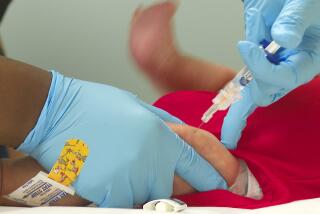Rubella Wiped Out in the U.S.
- Share via
WASHINGTON — Rubella, a virus known to cause birth defects, miscarriages and stillbirths, has been eliminated in the United States, the Centers for Disease Control and Prevention announced Monday.
“This is an achievement ... but the story is not done yet,” said Dr. Julie Gerberding, director of the CDC in Atlanta. “There are still parts of the world where immunization is not common or not common enough to prevent children from developing congenital rubella.”
Because worldwide eradication of rubella is a long way off, children should still be immunized against the disease, Gerberding said. “The goal in the United States is ultimately to have all children vaccinated effectively against rubella and the other vaccine-preventable childhood illnesses, because we are at constant risk for reintroduction of the virus from other parts of the world,” she said.
Ninety-three percent of American children younger than 2 and 95% of school-aged children have received the rubella vaccine.
Also known as German measles, rubella is a mild infectious disease often causing a rash and fever. The disease is most dangerous for pregnant women as it can cause miscarriage, stillbirth or rubella-related birth defects. Congenital rubella syndrome, the term indicating such defects, can include deafness, cataracts, heart problems, mental retardation, and liver and spleen damage, the CDC said.
A U.S. rubella epidemic in 1964 and 1965 caused 12.5 million cases, resulting in 20,000 cases of congenital rubella syndrome, 11,250 fetal deaths and 2,100 infant deaths, according to the CDC.
Since 1969, when the rubella vaccine was introduced in the United States, occurrences have fallen from 57,686 to nine cases last year, the CDC said. None of the nine cases originated in the U.S. There has not been a case of rubella that was initiated in the U.S. since 2000, said Dr. Stephen Cochi, acting director of the CDC’s national immunization program.
The announcement makes the United States the second nation in the world to eliminate rubella. The first was Cuba in 1995.
The Western Hemisphere is on track to eliminate rubella, with fewer than 2,000 cases last year, according to the Pan American Health Organization.
In 2003 all the health ministers in the Americas designated 2010 as the goal for elimination of the disease. The small number of rubella cases is due largely to vaccination programs targeted at adults as well as children, said Dr. Mirta Roses Periago, the organization’s director.
“This is also a very important instrument for poverty reduction in our region,” she said at the CDC news conference. “You can imagine what it means for a poor family to have a newborn with disabilities, with very serious defects, and how this impairs their progress and the possibility for the whole family to improve their situation.”
The rubella vaccine is often given with vaccines for measles and mumps. In recent years claims that the measles, mumps and rubella vaccination, or MMR, has been linked to autism have led some parents to avoid immunizing their children.
“Right now there is no evidence of autism or other harmful associations with MMR in the area of developmental delay or disabilities,” Gerberding said. “The evidence indicates that this is a safe and effective vaccine and we will continue to emphasize its use.”
Medical experts praised the CDC for its accomplishment, but said the agency should encourage vaccinations for other illnesses, such as the flu, pneumonia and hepatitis B.
Dr. Ronald Davis, an American Medical Assn. trustee, said: “We need to celebrate successes like this, but also redouble our efforts to deliver vaccines that have not penetrated the population as much.”






